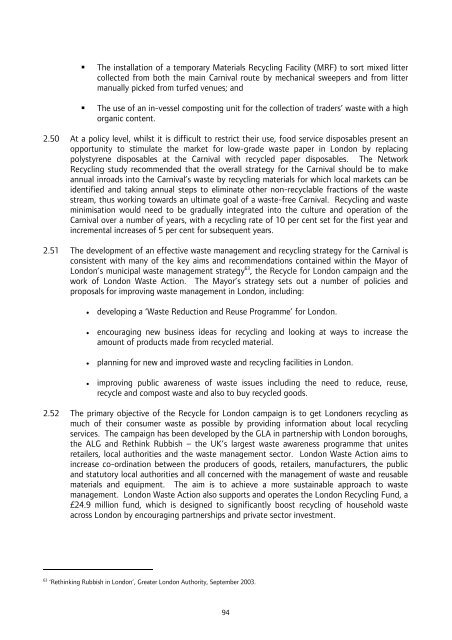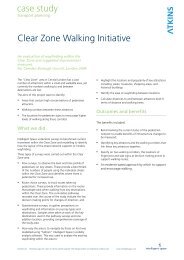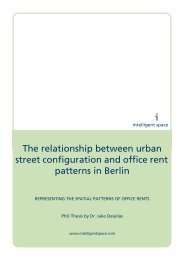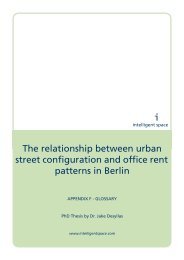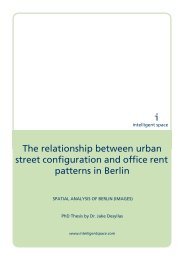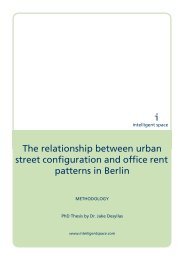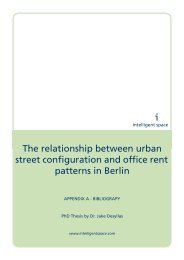Notting Hill Carnival Strategic Review - Intelligent Space
Notting Hill Carnival Strategic Review - Intelligent Space
Notting Hill Carnival Strategic Review - Intelligent Space
Create successful ePaper yourself
Turn your PDF publications into a flip-book with our unique Google optimized e-Paper software.
• The installation of a temporary Materials Recycling Facility (MRF) to sort mixed litter<br />
collected from both the main <strong>Carnival</strong> route by mechanical sweepers and from litter<br />
manually picked from turfed venues; and<br />
• The use of an in-vessel composting unit for the collection of traders’ waste with a high<br />
organic content.<br />
2.50 At a policy level, whilst it is difficult to restrict their use, food service disposables present an<br />
opportunity to stimulate the market for low-grade waste paper in London by replacing<br />
polystyrene disposables at the <strong>Carnival</strong> with recycled paper disposables. The Network<br />
Recycling study recommended that the overall strategy for the <strong>Carnival</strong> should be to make<br />
annual inroads into the <strong>Carnival</strong>’s waste by recycling materials for which local markets can be<br />
identified and taking annual steps to eliminate other non-recyclable fractions of the waste<br />
stream, thus working towards an ultimate goal of a waste-free <strong>Carnival</strong>. Recycling and waste<br />
minimisation would need to be gradually integrated into the culture and operation of the<br />
<strong>Carnival</strong> over a number of years, with a recycling rate of 10 per cent set for the first year and<br />
incremental increases of 5 per cent for subsequent years.<br />
2.51 The development of an effective waste management and recycling strategy for the <strong>Carnival</strong> is<br />
consistent with many of the key aims and recommendations contained within the Mayor of<br />
London’s municipal waste management strategy 63 , the Recycle for London campaign and the<br />
work of London Waste Action. The Mayor’s strategy sets out a number of policies and<br />
proposals for improving waste management in London, including:<br />
• developing a ‘Waste Reduction and Reuse Programme’ for London.<br />
• encouraging new business ideas for recycling and looking at ways to increase the<br />
amount of products made from recycled material.<br />
• planning for new and improved waste and recycling facilities in London.<br />
• improving public awareness of waste issues including the need to reduce, reuse,<br />
recycle and compost waste and also to buy recycled goods.<br />
2.52 The primary objective of the Recycle for London campaign is to get Londoners recycling as<br />
much of their consumer waste as possible by providing information about local recycling<br />
services. The campaign has been developed by the GLA in partnership with London boroughs,<br />
the ALG and Rethink Rubbish – the UK’s largest waste awareness programme that unites<br />
retailers, local authorities and the waste management sector. London Waste Action aims to<br />
increase co-ordination between the producers of goods, retailers, manufacturers, the public<br />
and statutory local authorities and all concerned with the management of waste and reusable<br />
materials and equipment. The aim is to achieve a more sustainable approach to waste<br />
management. London Waste Action also supports and operates the London Recycling Fund, a<br />
£24.9 million fund, which is designed to significantly boost recycling of household waste<br />
across London by encouraging partnerships and private sector investment.<br />
63<br />
‘Rethinking Rubbish in London’, Greater London Authority, September 2003.<br />
94


